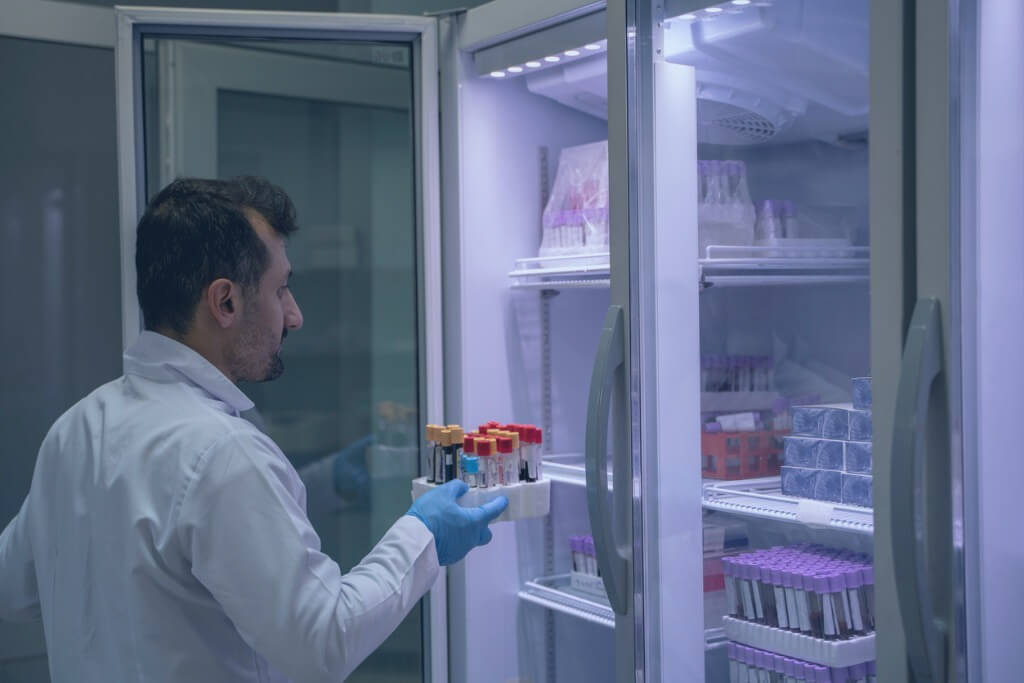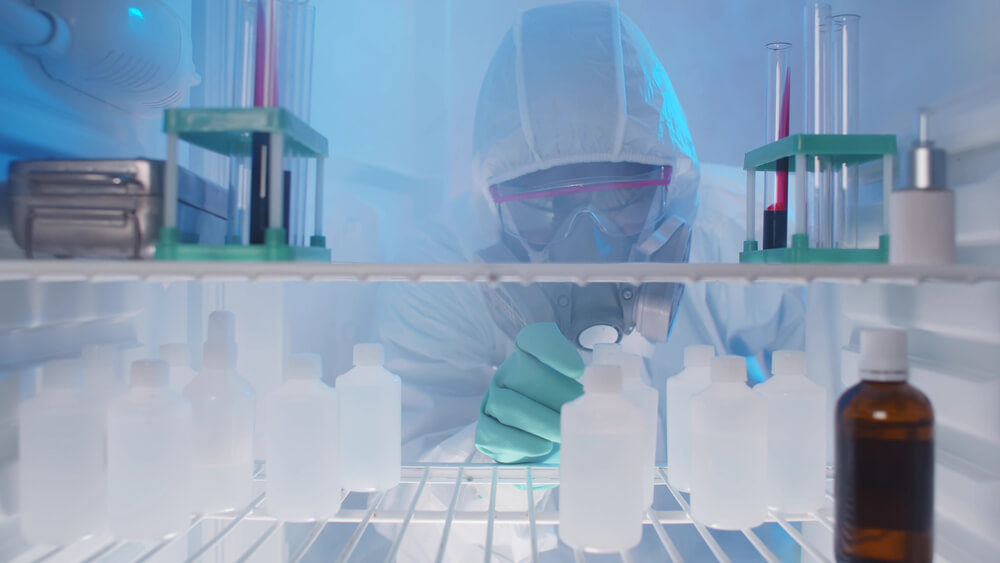Medical refrigerators and freezers are purpose-built units. They play a fundamental role in pharmaceutical and laboratory processes. These pharmaceutical-grade appliances are built by manufacturers to store biological material.
Medical Refrigeration differ from regular kitchen’s as they require specially designed equipment for lab purposes. Biomedical research laboratories need refrigeration to store samples, medication, vaccines, blood bags, or organs for transplant at precisely controlled temperatures.
Medical-grade appliances have a microprocessor-based system that precisely measures temperatures. These fridges provide uniform temperature stability. This way they preserve critical biological samples and serums.
Every medical facility has its own cold storage requirements. Usually, medicines are instructed to be stored at a specific temperature by the manufacturers. This specific temperature is usually between +2˚C and +8˚C, and ideally +5˚C.
Uses of Medical Refrigeration

- Besides the healthcare industry, such as in hospitals, clinics, research laboratories, surgery centers, and physician offices, medical refrigeration is also used in crime labs.
- Standard fridges can not serve in storing medicine and vaccines. They should be kept in specialized medical refrigerators.
- These medical fridges are made with robust materials that are more durable, have accurate temperature controls, and are less likely to fail.
- They are equipped with alarms that send alerts when a door is left open or if the temperature fluctuates.
- Grated shelves are used within to allow better airflow and maintain more consistent temperatures.
Advantages of Medical Refrigeration
These medical refrigeration machines have several advantages over typical household refrigeration units.
- The use of medical-grade refrigerators ensures a consistent cold chain supply system.
- Temperature fluctuations can make vaccinations ineffective and destroy biological materials. TMDs (Temperature Monitoring Devices) with digital data loggers (DDL) are recommended by the CDC for monitoring vaccination temperatures.
- Powerful air circulation systems with air-cooling vents are used in pharmaceutical refrigerators and freezers. This ensures proper air circulation and better ventilation of biological materials
- Digital locks are built into medical fridges to prevent illegal staff to access the biologics.
- Medical refrigerators and freezers Protect Biological Products from temperature excursions. They protect the vaccines by backup battery power sources or generators
Types of Medical Refrigeration

There are different medical refrigerators for various medical storage requirements. Here are the main types on the market today.
Explosion-Proof Fridge
An explosion-proof fridge is used to store substances that are combustible, volatile, flammable, or hazardous. As they have no electrical parts and no sparks that can trigger a fire, the risk of catching fire or exploding due to anything combustible is minimized
Blood Bank Fridge
Blood bank refrigerators are used for blood storage needs. They need to have different storage compartments so that different types of blood and blood products can easily be organized. These refrigerators should be reliable and have accurate temperatures to avoid any fluctuations in that can harm the medical supply
Chromatography Fridge
Chromatography refrigerators store and protect a variety of materials used in research, clinical, and industrial laboratories. They provide temperature uniformity and stability. They are available in a variety of models and sizes.
Lab Fridge
This is the most basic type of medical refrigerator. A laboratory fridge is used by healthcare facilities and professionals to store samples, specimens, vaccines, and medicines, at a specific temperature to ensure they do not become spoiled. They use accurate digital displays to show the temperature. They are easy to clean. They’re equipped with alarms and locks and are ideal for preserving or cooling down medical tools and samples.
Temperature and Humidity Controls for Medical Refrigeration
Medical or laboratory refrigerators have different requirements depending on what they are storing. There is no universal temperature setting for all vaccines or biological samples. It is always recommended to keep any kind of medical refrigerator within 2 to 8ºC but there are exceptions. The lower the temperature the more power it requires so it is best to use a fridge that closely meets temperature needs.
Before purchasing a clinical refrigerator, It is vital to know what temperature requirements the items you will be storing. Vaccines, biological samples, plasma, and other sensitive materials have unique temperature needs. So it is best to know the details before making a decision.
Low-humidity laboratory refrigerators minimize moisture. They are designed for seed storage and applications where the doors are opened and closed frequently. The feature of automatic defrost control keeps the medical laboratory refrigerators frost-free and running at optimum capacity
Maintenance and Troubleshooting for Medical Refrigeration

A medical fridge malfunctioning can be life-threatening for patients as well as medical practices and practitioners. It can also be harmful to the medical products inside the refrigerator. If vaccines fall outside their minimum and maximum recommended temperatures, it can alter the potency and effectiveness of a medical supply.
The cost of damaged and wasted vaccines can be millions of pounds. To avoid this devastating situation, it is recommended to maintain and keep your unit clean to improve its efficiency and extend its lifespan. Following are some tips you can follow
Pay attention to the alarms
Lab refrigerators are fitted with alarms for indicating low or high temperature, prolonged door opening, and power failure. Check the alarms for maintenance and cleaning .
Store all materials appropriately
Storing the medical material in racks ensures optimal use of the available stock. It also ensures correct, unobstructed airflow making it easier to locate samples. The boxes and containers can be stacked conveniently inside a refrigerator.
Clean door gaskets
The gasket is designed to create a tight seal throughout the edges of the fridge door. It prevents cold air from escaping and warm air from entering. This maintains uniform temperatures within the unit’s internal components.
Check door gaskets for leaks and any accumulations of ice at the weak points. Wipe them down quite often using a soft cloth to get rid of any dirt or dust that may compromise the overall performance of the refrigerator.
Remove ice or frost build-up regularly
Opening the fridge door repeatedly may result in a build-up of ice or frost. Therefore, periodically inspect the gaskets and door seals for the accumulation of frost. Try to get your samples in and out of the device as quickly as you can
Take care of the coils
Keep the coils clean at all times. Keep them free from accumulated dust, or any other material that may hinder the intended heat exchange.
Clean regularly
Cleaning could also prolong the lifespan of your lab fridge. Trash the useless items and ensure that you keep cleaning and wiping all the shelves down. Also, do the same for the refrigerator racks and walls.
Dampen the cloth with warm water and remove crumbs and wipe down spills from the walls and shelves. An all-purpose cleaner could make things easier and take on sticky spills and stains without much effort.
Also Read: How to Clean a Walk-in Freezer?
Preventive Maintenance of Medical Refrigeration
Regular tune-up and maintenance on medical refrigeration should be done at least once annually. If reading this piece of content leaves you worried that you have not been doing much in terms of caring for your medical laboratory refrigerator, then do not fret. You can hire a reliable service provider if you lack sufficient time for all these maintenance practices.
Contact Alturas HVAC contractors. We provide commercial refrigeration Los Angeles installation, repair, and maintenance services. In case of emergency maintenance, our professional technicians will run a diagnosis and figure out the issue. This way, you can be sure that your equipment is properly maintained and will remain functional for longer. Through thorough preventive maintenance of medical refrigerators, you can be sure that these crucial pieces of lab equipment will serve you reliably for years.

